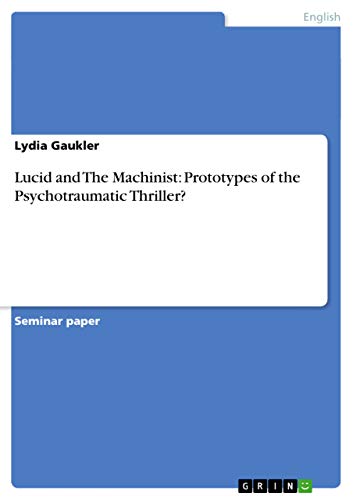Verwandte Artikel zu Lucid and The Machinist: Prototypes of the Psychotraumatic...

Zu dieser ISBN ist aktuell kein Angebot verfügbar.
Alle Exemplare der Ausgabe mit dieser ISBN anzeigen:„Über diesen Titel“ kann sich auf eine andere Ausgabe dieses Titels beziehen.
- VerlagGRIN Verlag
- Erscheinungsdatum2009
- ISBN 10 3640330668
- ISBN 13 9783640330669
- EinbandTapa blanda
- Auflage2
- Anzahl der Seiten52
Neu kaufen
Mehr zu diesem Angebot erfahren
Versand:
EUR 23,00
Von Deutschland nach USA
Beste Suchergebnisse bei AbeBooks
Lucid and The Machinist: Prototypes of the Psychotraumatic Thriller?
Buchbeschreibung Taschenbuch. Zustand: Neu. This item is printed on demand - it takes 3-4 days longer - Neuware -Seminar paper from the year 2007 in the subject English Language and Literature Studies - Culture and Applied Geography, University of Mannheim, language: English, abstract: It is common ground that films offer a richness and an intensity that cannot be found in any other medium. The unique combination of visual and acoustic elements; the work-ing together of language, gesture, mimic and music; of images and sound, offer an im-pressive account of reality. Wedding explains: 'With the best films, the viewer experi-ences a sort of dissociative state in which ordinary existence is temporarily suspended. No other art form pervades the consciousness of the individual experiencing it to the same extent and with such power.' Of course one may argue that some literary works can have the same absorbing effect, still the medium film is undoubtedly a very power-ful one when it comes to captivating people's attention. Films 'have become a perva-sive and omnipresent part of our society with little conscious awareness of the pro-found influence the medium may be exerting' . One extremely widespread and popular genre is the thriller and its subgenres. Ranging from spy, gangster and science-fiction films to horror films, splatters and stalkers, there is hardly any film that has not been labelled a thriller. A relatively new develop-ment within the thriller is the topic of mental illness and psychopathology. Two recent examples are The Machinist by Brad Anderson and Lucid by Sean Garrity. In both films, the directors concern themselves with trauma and its impact on the psyche of the re-spective protagonists. In his book 'The Suspense Thriller', Derry outlines a new thriller subgenre: the psy-chotraumatic thriller. I shall like to discuss whether Lucid and The Machinist may or may not be subsumed under this label.In the following, I will first outline the plots of the two films. Then I shall want to concen-trate on the acute and post-traumatic stress disorder of the main protagonists. After that, I shall have a look at the thriller genre in general and at the posttraumatic thriller genre in particular. Touching briefly on the question why films are especially well suited to depict psychopathological films and what possibilities directors have to por-tray mental illness, I shall like to continue with Derry's eight-part formula of the psy-chotraumatic thriller. 28 pp. Englisch. Bestandsnummer des Verkäufers 9783640330669
Weitere Informationen zu diesem Verkäufer | Verkäufer kontaktieren
Lucid and The Machinist: Prototypes of the Psychotraumatic Thriller?
Buchbeschreibung Taschenbuch. Zustand: Neu. Druck auf Anfrage Neuware - Printed after ordering - Seminar paper from the year 2007 in the subject English Language and Literature Studies - Culture and Applied Geography, University of Mannheim, language: English, abstract: It is common ground that films offer a richness and an intensity that cannot be found in any other medium. The unique combination of visual and acoustic elements; the work-ing together of language, gesture, mimic and music; of images and sound, offer an im-pressive account of reality. Wedding explains: 'With the best films, the viewer experi-ences a sort of dissociative state in which ordinary existence is temporarily suspended. No other art form pervades the consciousness of the individual experiencing it to the same extent and with such power.' Of course one may argue that some literary works can have the same absorbing effect, still the medium film is undoubtedly a very power-ful one when it comes to captivating people's attention. Films 'have become a perva-sive and omnipresent part of our society with little conscious awareness of the pro-found influence the medium may be exerting' . One extremely widespread and popular genre is the thriller and its subgenres. Ranging from spy, gangster and science-fiction films to horror films, splatters and stalkers, there is hardly any film that has not been labelled a thriller. A relatively new develop-ment within the thriller is the topic of mental illness and psychopathology. Two recent examples are The Machinist by Brad Anderson and Lucid by Sean Garrity. In both films, the directors concern themselves with trauma and its impact on the psyche of the re-spective protagonists. In his book 'The Suspense Thriller', Derry outlines a new thriller subgenre: the psy-chotraumatic thriller. I shall like to discuss whether Lucid and The Machinist may or may not be subsumed under this label.In the following, I will first outline the plots of the two films. Then I shall want to concen-trate on the acute and post-traumatic stress disorder of the main protagonists. After that, I shall have a look at the thriller genre in general and at the posttraumatic thriller genre in particular. Touching briefly on the question why films are especially well suited to depict psychopathological films and what possibilities directors have to por-tray mental illness, I shall like to continue with Derry's eight-part formula of the psy-chotraumatic thriller. Bestandsnummer des Verkäufers 9783640330669
Weitere Informationen zu diesem Verkäufer | Verkäufer kontaktieren

